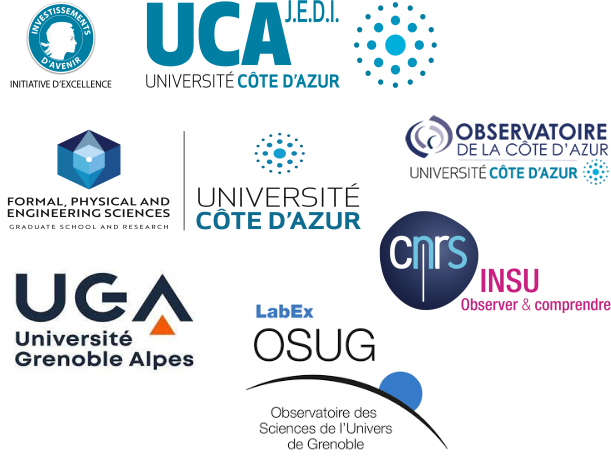
|
|
|
|
School outline Earthquakes remain unpredictable, despite decades of intense investigations into possible precursory phenomena. The main difficulty lies in our incomplete knowledge of the state of stress on active faults at seismogenic depths, and a full understanding of how rupture initiates and stops in a complex medium characterized by a variable stress field acting on complex fault geometries. In the last decade, however, great advances have converged towards a much more complete picture of earthquake-related processes. The quality and quantity of seismic data, as well as their diffusion to research scientists through open-data policies, have been much improved, most recently owing to the development of very dense and / or very sensitive seismic networks, and a gain in location accuracy; the ubiquitous nature of aseismic slip has become apparent; and recent mega-thrust and continental earthquakes have provided the seismological community with very rich datasets that help illuminate possible relationships between seismic and aseismic processes. This school will follow on two editions that were held in November 2014 and October 2017 (e.g. see http://earthquakes.sciencesconf.org/, as well as https://eos.org/meeting-reports/exploring-earthquakes-slow-slip-and-triggering for a report on this school). Each edition had about 100 participants (mainly PhD students and post-docs), from more than 15 countries. The goal remains to give an accurate snapshot of our current understanding of earthquakes, in the light of recent advances. About 20 scientists from all around the world (mostly Europe and US), at the cutting-edge of earthquake research, will give lectures, covering various topics related to recent developments in earthquake processes, including nucleation, triggering, rupture, and the seismic cycle as a whole. The school is intended to stimulate the emergence of a much wider understanding of the current issues and progress among young scientists (PhDs and post-docs), and will thus facilitate future collective progress towards earthquake preparedness and forecasting, as well as to the development of international research networks. The school will revolve around 4 main sessions:
The first part of afternoons will be dedicated to group discussions on topics of special interest and hands-on tutorials.
Registering and Accomodation fees Pre-registration is now closed. Priority will be given to Ph.D. candidates, post-doctoral fellows, young researchers, and new participants. Participants will have the opportunity to give oral (10 to 15 minutes long) or poster presentations. In either case, please submit a pdf file indicating the title, the authors, the type (oral / poster) of the presentation, and a short abstract. Limited funding is available to support some participants. Please mention and motivate your request (registration fee and/or flight) when pre-registering. NOTE: there will be no online sessions organized. --- Final registration: if selected, connect again on the registration platform to confirm and enter your flight details and accommodation preferences. Accommodation fees: There are no registration fees but you're required to pay for your accommodation. The fees (370,50€) cover accommodation in a single room with breakfasts and lunches included. Dinners, except one, are not covered. We will organize a transfer by bus from/to Ajaccio airport on Sept. 26th and Oct. 2nd: prefer flights arriving in the middle of the Sunday afternoon and leaving on Saturday morning.
Logistics The school will be held at the Institut des Etudes Scientifiques de Cargèse, Corsica, France. All the details on the location and the facilities can be found at the IESC webpage. Transportation will be arranged by bus from Ajaccio airport (AJA) the first and last days of the school. Most flights to Ajaccio are from Paris, Marseille and Nice. It is also possible to take a ferry from Marseille, Toulon and Nice. List of comfirmed speakers Whitney Behr (ETH Zurich), Gregory Beroza (Stanford University), Fabrice Cotton (GFZ Potsdam), Ylona van Dinther (Utrecht University), Martijn van den Ende (University Côte d'Azur), William Ellsworth (Stanford University), Claudia Hulbert (Los Alamos National Lab), Satoshi Ide (University of Tokyo), Asaf Inbal (Tel Aviv University), Chris Marone (Sapienza Università di Roma), David Marsan (Université Grenoble Alpes),Anne Socquet (University of Grenoble Alpes)
Scientific Committee
Sponsors Our warm thanks to the sponsors making this event possible:
University Côte d'Azur UCAJEDI: National Initiative of Excellence progam of University Côte d'Azur http://univ-cotedazur.fr/en/idex/initiative-of-excellence-idex EUR SPECTRUM: Formal, physical and engineering sciences graduate school of University Côte d'Azur https://spectrum.univ-cotedazur.fr/ Côte d’Azur Observatory INSU, the CNRS National Institute for Earth Sciences and Astronomy, with support of the TelluS Program University Grenoble-Alpes https://www.univ-grenoble-alpes.fr/ Grenoble Observatory Contact For enquires please contact: Anthony Sladen (sladen"at"geoazur.unice.fr) |
| Online user: 8 | Privacy |

|



